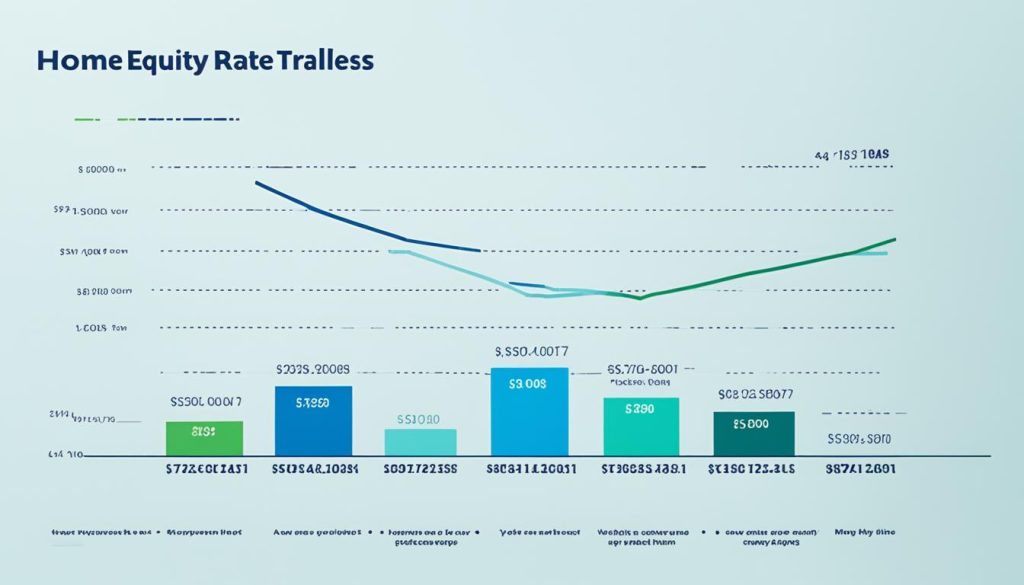As a homeowner, your property holds a valuable asset: home equity. This equity can be a valuable source of quick and potentially lower-cost cash in times of financial emergencies or when you need funds for important expenses. American Express offers a range of home equity financing options to help you unlock the value of your home and achieve your financial goals.
Amex home equity loans, also known as American Express home loans, provide a straightforward solution for homeowners looking to access their home’s equity. With competitive interest rates and flexible terms, an Amex home equity loan can be a smart financial decision that empowers you to make the most of your home’s value.
In this article, we will explore the benefits of an Amex home equity loan and the various options available to homeowners. Whether you’re considering shared equity agreements, traditional financing options like home equity loans and HELOCs, or cash-out refinances, we’ll provide the information you need to make an informed decision.
Key Takeaways:
- Home equity is a valuable asset that homeowners can tap into for quick cash.
- Amex offers a variety of home equity financing options, including home equity loans.
- Homeowners have multiple avenues to unlock their home’s equity.
- Understanding the requirements, interest rates, and repayment terms is crucial.
- Amex home equity loans provide competitive rates and flexible terms.
Accessing Home Equity Through Sharing Agreements
When it comes to unlocking your home equity, shared equity agreements can offer an alternative way to get equity out of your home. These agreements, also commonly referred to as equity investment companies, allow homeowners to sell a portion of the ownership in their home in exchange for cash.
Shared equity agreements are particularly appealing for homeowners who may not qualify for traditional home equity loans or want to avoid taking on additional monthly payments. By entering into a shared equity agreement, homeowners can access the value of their home without assuming additional debt. This option can be especially useful for those looking for more flexible financing options.
The process of obtaining a shared equity agreement is often quicker and has more lenient criteria compared to traditional home equity loans. This means that homeowners who may have difficulty meeting the strict requirements of a conventional loan may still be eligible for a shared equity agreement. The application and approval process is typically streamlined, offering homeowners a faster way to access the cash they need.
Furthermore, shared equity agreements provide homeowners with more control over their financial situation. Homeowners can choose to sell a percentage of their home’s equity based on their specific needs, ensuring they receive an appropriate amount of cash while still maintaining a stake in their property.
Overall, shared equity agreements offer a flexible and accessible option for homeowners to tap into their home equity. With more lenient criteria, quick approval times, and the ability to avoid additional monthly payments, it’s no wonder that these agreements are gaining popularity as an alternative way to get equity out of the home.
Advantages of Shared Equity Agreements
There are several advantages to consider when exploring shared equity agreements:
- Access to cash without adding to monthly payments
- Flexible financing options for homeowners who may not qualify for traditional home equity loans
- Quick application and approval process
- More control over the amount of equity sold
By weighing these advantages, homeowners can make an informed decision about whether a shared equity agreement is the right choice for accessing their home equity.
| Shared Equity Agreements | Equity Investment Companies | Alternative Ways to Get Equity Out of Home |
|---|---|---|
| Allows homeowners to sell a portion of their home’s ownership in exchange for cash | Also known as equity investment companies | Offers an alternative option for homeowners who may not qualify for traditional home equity loans |
| No additional monthly payments required | Provides access to cash without increasing debt | More lenient criteria and faster approval process |
| Flexible financing options tailored to homeowners’ needs | Enables homeowners to retain a stake in their property | Gaining popularity as a viable alternative to accessing home equity |
Home Equity Loans and HELOCs: Traditional Financing Options
When it comes to tapping into your home’s equity, there are traditional financing options available that can provide you with the funds you need. Home equity loans and HELOCs (Home Equity Lines of Credit) are two popular choices that allow homeowners to borrow against their equity and access cash for various purposes.
A home equity loan provides you with a lump sum of money, similar to a traditional loan. The amount you can borrow depends on the equity you have built up in your home. These loans typically come with a fixed interest rate, which means your monthly payments will remain stable over the repayment period. If you have a one-time expense or a specific project to fund, a home equity loan can be a suitable option.
On the other hand, a HELOC provides you with a line of credit that you can access as you need it. This option works similar to a credit card, where you can borrow up to a certain limit and only pay interest on the amount you have borrowed. HELOCs usually have a variable interest rate, which means your monthly payments may fluctuate based on the market conditions. HELOCs are ideal for ongoing expenses or situations where you may not know the exact amount you need upfront.
Both home equity loans and HELOCs have repayment terms that you need to consider. With a home equity loan, you will typically have a fixed repayment period, often ranging from five to 30 years. On the other hand, a HELOC usually has two phases – a draw period and a repayment period. During the draw period, which can last several years, you can borrow from the line of credit. Once the draw period ends, you enter the repayment period, during which you must start paying back what you borrowed plus interest.
It’s important to note that both options may come with fees such as origination fees, appraisal fees, and closing costs. These costs can vary depending on the lender and the amount you are borrowing. Make sure to compare different offers and understand all the fees associated with each option before making a decision.
Comparison between Home Equity Loans and HELOCs:
| Home Equity Loans | HELOCs | |
|---|---|---|
| Interest Structure | Fixed | Variable |
| Funds Disbursement | Lump Sum | Line of Credit |
| Repayment Terms | Fixed repayment period | Draw period + Repayment period |
| Flexibility | Less flexible as you receive a fixed amount | More flexible as you can borrow as needed |
| Interest Rate | Fixed rate for the entire term | Variable rate tied to market conditions |

Cash-out Refinances: Another Option to Access Home Equity
When it comes to unlocking the equity in your home, cash-out refinances provide an alternative solution to consider. With a cash-out refinance, you can replace your current mortgage with a larger loan and receive the difference in cash, allowing you to access a significant amount of money at once. This option is particularly beneficial if you have substantial equity built up in your home and need additional funds for various purposes.
One of the main advantages of cash-out refinances is the ability to secure a larger mortgage loan. By borrowing against your home’s equity, you can potentially receive a substantial amount of cash to cover expenses such as home renovations, debt consolidation, or even funding educational expenses.
Another significant benefit of cash-out refinances is the potential for a lower interest rate. Compared to other forms of consumer debt, such as credit cards or personal loans, the interest rate on a cash-out refinance is typically much lower. This means that you’ll pay less in interest over the life of the loan, saving you money in the long run.
It’s important to note that cash-out refinances come with specific requirements and considerations. Lenders will evaluate factors such as your credit score, employment and income stability, and debt-to-income ratio to determine your eligibility. Additionally, the loan-to-value ratio, which compares the loan amount to the appraised value of your home, will also be taken into account.
To give you a better understanding of the benefits and considerations of cash-out refinances, here’s a breakdown:
| Benefits | Considerations |
|---|---|
|
|
It’s essential to carefully consider the potential benefits and requirements before pursuing a cash-out refinance. Consulting with a reputable mortgage lender can help you understand the specific terms, interest rates, and eligibility criteria.

Exploring cash-out refinances as a means to access home equity can provide you with the financial flexibility and resources you need. While it’s crucial to ensure you meet the necessary requirements and understand the implications, this option can be a viable solution for obtaining a larger loan and accessing the cash difference.
Home Equity Loan Interest Rates and Requirements
When considering a home equity loan, it’s important to understand the interest rates and requirements associated with this type of borrowing. Home equity loan interest rates are often lower compared to other forms of consumer debt, making them an attractive option for homeowners looking to access their equity.
Lenders have specific requirements in place to determine eligibility for a home equity loan. These requirements typically include:
- Credit score: A minimum credit score is often required by lenders to ensure the borrower’s ability to repay the loan. A higher credit score can also lead to more favorable interest rates.
- Employment and income: Lenders may request proof of employment and income to assess the borrower’s ability to make monthly loan payments.
- Debt-to-income ratio: This ratio compares the borrower’s monthly debt obligations to their monthly income. Lenders typically have maximum debt-to-income ratios that borrowers must meet to qualify for a home equity loan.
- Loan-to-value ratio: The loan-to-value (LTV) ratio is calculated by dividing the amount of the loan by the appraised value of the property. Lenders have maximum LTV ratios that borrowers must adhere to.
Meeting these requirements can improve a borrower’s chances of getting approved for a home equity loan. It’s important to note that each lender may have slightly different criteria, so it’s advisable to research and compare multiple lenders to find the best loan terms and interest rates for your specific situation.
Benefits of Home Equity Loan Interest Rates
Home equity loan interest rates are typically lower compared to other forms of consumer debt. This can result in significant savings over the life of the loan and make a home equity loan a more affordable borrowing option.
Lower interest rates mean lower monthly payments, allowing homeowners to access their equity while maintaining a manageable repayment plan. Home equity loans may also offer fixed interest rates, providing borrowers with stability and predictability in their loan payments.

By carefully considering the interest rates and requirements of home equity loans, homeowners can make informed decisions about leveraging their home’s equity. Taking the time to research different lenders and compare loan options can help borrowers find the most favorable terms and conditions that suit their financial goals and circumstances.
Conclusion
In conclusion, an Amex home equity loan provides homeowners with a reliable and accessible solution to tap into their home’s equity. Whether through shared equity agreements, traditional financing options like home equity loans and HELOCs, or cash-out refinances, homeowners have a range of choices to unlock their equity responsibly and meet their financial needs.
By taking the time to understand the requirements, interest rates, and repayment terms of these options, homeowners can make informed decisions about leveraging the value of their home to achieve their financial goals. The American Express home equity loan program offers a variety of options to suit different needs, making it a trusted choice for homeowners seeking reliable home financing.
With American Express home lending, homeowners can access the equity in their homes for various purposes including home improvements, debt consolidation, and educational expenses. The flexible repayment terms and competitive interest rates make American Express home financing an attractive choice for many homeowners looking for financial flexibility and stability.
FAQ
Can homeowners use their home equity as a source of quick cash?
What are shared equity agreements?
What are the benefits of shared equity agreements?
What are home equity loans and HELOCs?
What are the advantages of home equity loans and HELOCs?
What are cash-out refinances?
How do cash-out refinances work?
What are the requirements for home equity loans?
How do interest rates for home equity loans compare to other forms of consumer debt?
Source Links
- https://www.bankrate.com/home-equity/how-to-access-home-equity-financial-emergency/
- https://www.theretirementgroup.com/featured-article/5448090/decoding-the-home-equity-line-of-credit-heloc-weighing-the-pros-and-cons-for-american-express-employees
- https://www.bankrate.com/home-equity/what-is-home-equity-loan/




No comments! Be the first commenter?